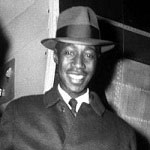In 1960, Clyde Kennard was attempting to become the first African American to enroll at Mississippi Southern College (now the University of Southern Mississippi) when he was wrongfully convicted as an accessory to a burglary of $25 worth of chicken feed from a farmer’s co-op.
The conviction rested almost entirely on the testimony of the true perpetrator, a nineteen-year-old Co-op employee named Johnny Lee Roberts, who admitted to stealing the goods and portrayed Kennard as his accomplice. An all-white jury deliberated only ten minutes before returning a verdict of guilty. Kennard was sentenced to seven years in prison. The following year, he began losing weight and experiencing severe abdominal pain, which was misdiagnosed as sickle cell anemia. A year later the condition was correctly diagnosed as colon cancer. In 1963, Kennard received clemency on medical grounds a few months before the disease took his life.
Now, forty-six years after the wrongful conviction, Roberts has recanted the testimony, attesting that Kennard was innocent, and the Center on Wrongful Convictions has joined with the Adlai Stevenson High School National History Day Club of Lincolnshire, Illinois, in pursuit of a posthumous pardon for Kennard.
In a memorandum filed with Mississippi Governor Haley Barbour, the Center asserts that Kennard’s wrongful conviction also robbed him of his rightful place in history. Instead of being honored as a hero of Mississippi’s civil rights movement along with Medgar Evers and James Meredith, Kennard was relegated to a footnote in history until the case was investigated in 1991 by reporter Jerry Mitchell of the Clarion Ledger.
Mitchell’s stories led the University of Southern Mississippi to own up to its role in the Kennard tragedy, honoring Kennard in 1993 by naming its student center after him and Walter Washington, the first African American to receive a doctorate from university.
More recently, Mitchell obtained the Roberts recantation, which is the catalyst for the current effort to obtain the posthumous pardon for Kennard.
The CWC Memorandum (pdf)
Exhibits (pdf)

